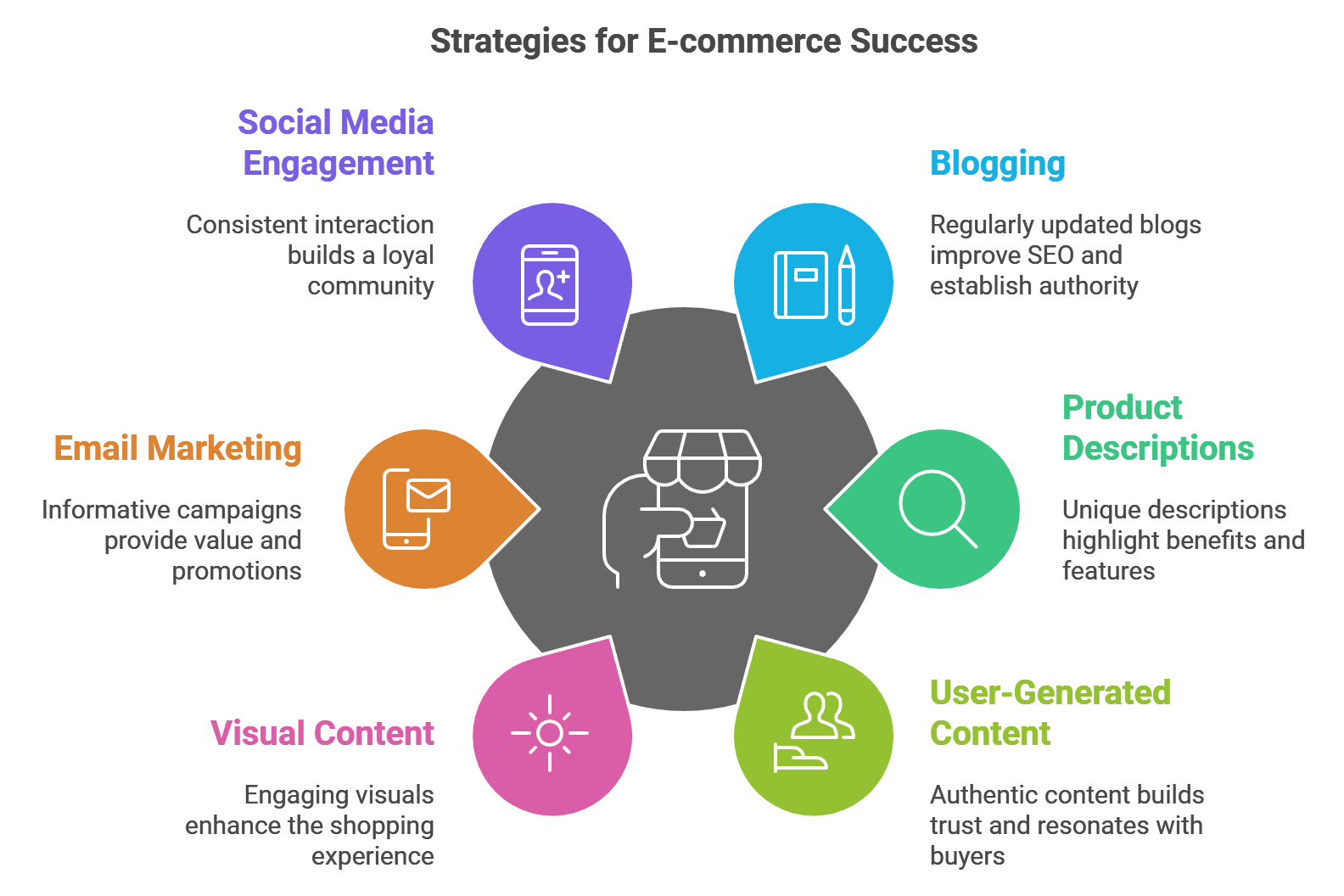Blog To Basket: Smart Content Marketing For Ecommerce Websites
SETH GODIN | MARKETING EXPERT & AUTHOR
It is about the stories you tell...
Marketing is no longer about the stuff you make, but about the stories you tell.
Ecommerce now makes up 15.6% of all retail sales as of 2023, highlighting the growing importance of online stores. Content marketing for ecommerce is key to success in this competitive world. Learn more about content marketing for ecommerce from HubSpot.
MVMT, a watch brand, went from zero to $90 million in just five years by effectively using social media, storytelling, and user content. This not only boosted sales but also built a community of 1.5 million customers and 5 million followers.
Marketing for online stores has changed significantly. Now, 82% of marketers use content marketing. Read more about content marketing statistics from Oberlo. It is now a key method for driving traffic and sales, transforming how businesses reach their audiences online.
In this article, we'll explore how to make your ecommerce site stand out, including writing great product descriptions and leveraging customer content to increase sales.
Key Takeaways:
- Ecommerce sales represent 15.6% of all retail transactions in 2023.
- MVMT grew to $90 million in 5 years through effective content marketing.
- 82% of marketers actively use content marketing strategies.
- Content marketing can significantly improve organic traffic for ecommerce sites.
- Effective ecommerce content strategies include awareness content, sales-centric content, and thought leadership.
- Regular performance tracking using tools like Google Analytics is crucial for success.
Want to listen? This content is available on Spotify
Ready to start?
Understanding The Importance Of Content Marketing In Ecommerce
Mapping Content To The Customer Journey
Mapping the customer journey is essential for creating content that effectively reaches potential buyers at each stage of their decision-making process.
By understanding the journey from awareness to consideration to decision, ecommerce businesses can create targeted content that meets customer needs at every step. This can include educational blog posts for awareness, product comparison guides for consideration, and special offers or detailed product descriptions for decision-making.
Content marketing is crucial for ecommerce success. It helps online stores connect with their audience, answer common questions, and improve search engine rankings. A well-designed strategy can boost sales and attract more customers.
Defining Content Marketing For Online Stores
Content marketing for ecommerce involves creating valuable information for a specific audience, aimed at informing and guiding potential buyers. This includes product reviews, blog posts, images, and videos.





Benefits Of Content Marketing For Ecommerce Businesses
Having a strong content marketing strategy brings numerous benefits:
- Enhanced SEO: Quality content helps Google understand your offerings and improves search visibility.
- Increased trust: Valuable content builds credibility with potential customers.
- Lower acquisition costs: Engaging content can reduce customer acquisition expenses.
- Higher conversion rates: Well-crafted content guides customers through the buying journey.
Key Content Types For Ecommerce Websites
Successful ecommerce content marketing includes a variety of content types:
- Product descriptions: Detailed, engaging information about your offerings.
- Blog posts: Informative articles related to your products or industry.
- Visual content: High-quality images and videos showcasing products.
- User-generated content: Customer reviews and testimonials.
- Email campaigns: Personalized content delivered directly to customers.
A Semrush study in 2023 found that 96% of ecommerce businesses using content marketing saw positive results. By creating diverse, high-quality content, online retailers can better attract and retain customers.
8 Effective Ecommerce Marketing Strategies
Developing A Comprehensive Content Strategy
Using Data To Drive Content Creation
A data-driven content strategy is essential for creating relevant and impactful content. Using tools like Google Analytics, heatmaps, and customer surveys helps identify what resonates most with your audience.
Check out Google's guide to Google Analytics. This approach allows businesses to continually refine their content strategy based on performance metrics, ensuring that content remains relevant and effective.
Finding The Right Channels
A strong content strategy requires identifying the best channels for your brand, such as blogs, social media, or videos. Consistency is key to building a loyal audience.
The Hundreds, a streetwear brand, used its blog to share industry insights daily for ten years, leading to high traffic and backlinks.
Elements Of A Successful Content Strategy
- Engaging product descriptions that tell a story.
- Educational articles to inform and attract customers.
- Interactive content like quizzes to boost engagement.
- User-generated content for social proof.
| Content Type | Benefits | Example |
|---|---|---|
| Educational Articles | Attracts visitors, builds trust | MADE's "IDEAS" section |
| Interactive Content | Increases engagement, personalises experience | ThirdLove's fit finder quiz |
| Product Storytelling | Emotionally connects with audience | Birchbox's detailed usage instructions |
Creating successful ecommerce content means educating customers. Understanding their needs and tailoring content accordingly can boost sales and search rankings.
Discover MAP
The Ultimate Affiliate Ecosystem
Master Affiliate Profits (MAP) is a ground-breaking ecosystem designed by marketing experts John Thornhill, Omar Martin, and Melinda Martin.
Content Marketing For Ecommerce: Essential Tactics
Leveraging AI For Content Marketing
Leveraging AI tools like Writesonic, ChatGPT, or Jasper can enhance content creation for ecommerce websites.
These AI-driven platforms assist in generating product descriptions, blog posts, and social media content at scale, allowing businesses to save time and maintain consistency. AI can also personalize content based on customer behaviour, making it more relevant and effective.
Creating Engaging Product Descriptions
Writing great product descriptions is crucial. Use vivid language to highlight unique features and benefits. Amazon's A+ content helps brands stand out in a crowded market.
Leveraging User-Generated Content
User-generated content builds trust and authenticity. Encourage customers to share reviews, photos, and videos of your products. Mini Katana, for example, grew to 1.05 million YouTube subscribers and 280,000 Instagram followers without using ads.

Utilizing Visual Content For Maximum Impact
Visual content is vital for online stores. High-quality images and videos showcase products in detail, making buyers more confident. Beardbrand's video content got 71,000 views in eight days, helping their YouTube channel grow to over 1 million subscribers. Learn more about Beardbrand's content marketing approach on Shopify.
Implementing An Effective Blog Strategy
A strong blog strategy can drive traffic and engagement. The Bobby Hundreds' streetwear blog gets over 65,000 monthly pageviews and has earned more than 87,000 backlinks. Ecommerce email content marketing can help your blog by nurturing leads and encouraging repeat purchases.
Case Studies: Real-World Success With Content Marketing
Case studies provide tangible evidence of how effective content marketing strategies drive growth for ecommerce businesses. For instance, a small home goods store used educational videos to explain product usage, resulting in a 30% increase in customer engagement and a 15% boost in conversion rates.
Similarly, a niche fashion brand saw a 40% increase in organic traffic by focusing on long-form blog content that addressed common customer questions.
Discover The Path To Passive Income Success
Take the first step towards a lucrative future - sign up for exclusive insights and resources!
Optimizing Content For Search Engines And Conversions
On-Page SEO Techniques For Ecommerce Content
SEO content should focus on optimizing page titles, URL structures, and headings with target keywords. High-quality product images are crucial, as 67% of consumers consider them important in purchasing decisions. Aim for content exceeding 2,000 words to rank higher on search engines.
Crafting Compelling Calls-To-Action
Conversion-focused content is key to improving sales. Use strategic calls-to-action (CTAs) in blog posts to guide visitors toward desired actions. A/B testing helps determine which page layouts and CTAs lead to higher conversion rates.
Personalizing Content For Different Customer Segments
Shoppable content enhances user experience by showcasing products in various contexts. Personalized experiences can significantly improve engagement and conversion rates.
| SEO Strategy | Impact |
|---|---|
| Quality content (2,000+ words) | Higher search engine rankings |
| High-quality product images | 67% increase in consumer trust |
| Strategic CTAs | Improved user engagement and conversions |
| Personalised experiences | Enhanced user experience and higher conversion rates |
The Bottom Line
Econsultancy found that 100% of ecommerce companies see it as a way to boost sales. Read the Econsultancy survey results. This emphasizes the importance of a well-thought-out content strategy.
Ecommerce content goes beyond listing products. It includes blog posts, infographics, and other valuable resources. Unfortunately, only 32% of businesses have a clear content marketing plan. However, those that do experience significant increases in sales.
Content marketing works well across different platforms. For example, email marketing can yield $42 for every $1 spent. Social media is also crucial, with 78% of marketers using it to share content, resulting in an 18% increase in sales.
In short, the future of ecommerce lies in creating valuable content. With a solid content marketing plan, online stores can improve visibility and sales. The key is to consistently produce great content while keeping customer needs in mind.
Glossary Of Key Terms
- Content Marketing: Creating and distributing valuable, relevant, and consistent content to attract and retain a clearly defined audience — and, ultimately, to drive profitable customer action.
- E-commerce: Commercial transactions conducted electronically on the internet.
- Customer Journey: The complete sum of experiences that customers go through when interacting with your company and brand.
- SEO (Search Engine Optimization): The practice of increasing the quantity and quality of traffic to your website through organic search engine results.
- User-Generated Content (UGC): Content created by users of a system or service, often shared publicly.
- Call-to-Action (CTA): A marketing term that refers to the next step a marketer wants its audience or reader to take.
- Conversion Rate: The percentage of visitors to your website that complete a desired goal (a conversion) out of the total number of visitors.
- Personalization: The process of tailoring content, experiences, and communication to individual users based on their data and preferences.
- AI (Artificial Intelligence): The simulation of human intelligence processes by machines, especially computer systems.
- Data-Driven Content Strategy: A content marketing approach that relies on data insights to inform content creation, distribution, and optimization.
FAQ
Content marketing for ecommerce means creating and sharing valuable content to attract and retain customers. The goal is to teach, engage, and entertain, ultimately guiding customers through their buying journey.
Content marketing helps build strong relationships, attract customers, and lower acquisition costs. A good strategy increases customer value and grows the brand.
Key content types include high-quality product images and videos, user-generated content like reviews, blog posts, video guides, and detailed product descriptions.
Product descriptions should be clear, detailed, and persuasive. Use storytelling to highlight what makes the product special, include relevant keywords for SEO, and add customer reviews or social media posts to enhance credibility.
Visual content, like high-quality images and videos, is crucial because buyers want to see products up close before purchasing. It demonstrates the product's quality and features, helping to increase sales.
To optimize content for search engines and conversions, use on-page SEO techniques like keyword research and meta tags. Craft compelling CTAs, personalize content for different segments, and ensure content is easy to purchase from. Always test and refine your content.
